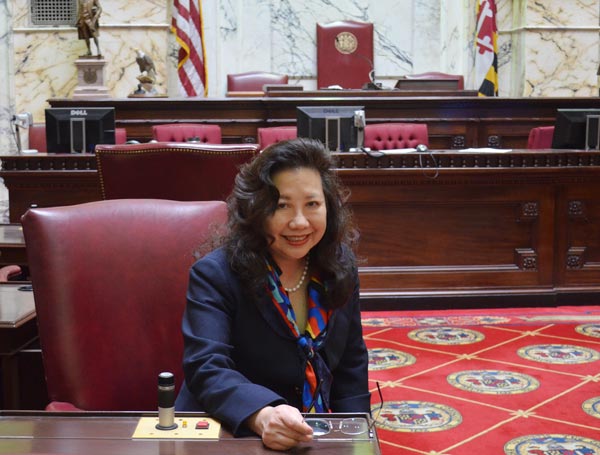
 |
|
Susan Lee, a three-term delegate of Maryland General Assembly, was elected as state senator during the recent election. Cai Chunying / China Daily |
Maryland State Senator Susan Lee wishes she could have learned to speak Chinese so she could have talked to her grandparents about how they overcame obstacles in life in the United States. When she was growing up, Chinese language schools were not around as they are now.
For Lee, who was born in the US with an ancestry traced to Guangdong province in China, her Chinese-American identity has always been a source of enlightenment during her pursuit of equality for her community.
A three-term member of the House of Delegates in Maryland from 2002 to 2014, Lee became the first Asian-American state senator of Maryland and first minority senator from Montgomery County when she defeated her Republican opponent on Nov 4.
With strong backing from Chinese and Asian communities during her campaign, Lee won the support of more than 70 percent of the electorate who are among the wealthiest and most well-educated in the greater Washington area.
Lee's ascent in Maryland politics got a solid foundation from her family.

"There is one big inspiration for me; that is my father," said Lee during an interview with China Daily at the Statehouse in Annapolis.
Lee's father, Harry Park Lee, a US Navy veteran of World War II and later the president of a federal labor union, was the first minority to hold the position. He was her rock.
Born and raised as a second-generation Chinese American in a grocery shopkeeper's family in San Antonio, Texas, in the 1920s, her father faced overwhelming discrimination.
"I used to listen to him talking for hours on the phone with his union colleagues about political strategy and how to get benefits for the workers and get better treatment," she said.
Lee's father passed away in July at the age of 88, shortly after Lee won the state Senate primary election. When he was lying in his deathbed, he was aware of her victory.
Lee's mother, China-born Mee Yee Lee, eventually became an artist with The Washington Post in the late 1960s and 1970s when very few Asian Americans had that kind of job.
"She was also an inspiration for me," said Lee, "she showed me that everything is possible as long as you try hard."
"They always instilled me this foundation that I had to do something to make a difference in our world and community," she added. "If you didn't get involved, nothing would change."
Lee had some tough times growing up in Maryland in the 1960s, when there were very few Asian Americans in Montgomery County.
"A group of kids hung around me and hurled racial comments almost every day for about a year. I just kept it inside me," she said. "I knew that I would one day overcome this."
Against the headwinds in middle school, Lee made up her mind to join the mainstream but also to fight against injustice. She chose to major in political science in college.
After getting her bachelor's degree in 1976 from the University of Maryland in College Park, Lee determined to immerse herself more in the Chinese community. For her, California was the best choice. The state has the highest concentration of Chinese immigrants.
Back to the place where her grandparents first landed from China in the 1900s, she attended the University of San Francisco School of Law.
Lee's first internship was with the Asian law Caucus, when she worked on helping low-income immigrants. Lee came back to the greater Washington area after getting her law degree in 1982 so she could get closer to the "heart of politics" while devoting herself to civil rights cases, which she described as "a destiny" in life.
Lee first worked as an attorney for the US Commission on Civil Rights for three years, then moved to the US Patent and Trademark Office. After five years, she joined law firms and gradually got active in local politics and was a member of the Montgomery County Democratic Central Committee.
Lee was nominated by the committee in 2002 to fill a vacancy as a delegate in the Maryland General Assembly, out of 15 other candidates. She, however, soon had to run a full-scale campaign to secure the seat after the session ended a few months later. Lee won the election and became the first Asian American woman and Chinese American ever elected to the 188-member legislative body.
"I never thought about being a delegate or senator, but when the opportunity opened up, I said why not," Lee recalled her motivation. "It's different when looking in the window from outside than being actually at the table and being able to actually write the laws and pass them to help communities. You can do so much."
Other than becoming the assembly's leader on cyber security and innovation, identity theft, online fraud, and consumer protection issues during her three terms, Lee indeed also focused on the immigrants, especially the Chinese and Asian American communities.
In 2006, with the aid of leading Chinese American community organizations as well as other Asian American groups, Lee and state Senator Brian Frosh helped win recognition of the Chinese Lunar New Year as an official day of commemoration in Maryland.
Lee, who served as deputy majority whip in the House of Delegates since 2003, said the legislative operation required not only devotion but also nimble political skills to bring in collaboration.
"We should cooperate and work with other communities, such as Latino, African and Jewish communities to make us stronger and make it easier to pass bills," said Lee, who also served as the president of Women Legislators of Maryland for two terms and led efforts in domestic violence, sexual assault, and human trafficking.
Lee recently helped get a law passed to offer crime victims translation assistance in court, which is particularly helpful to immigrants who often face obstacles due to language barriers. The passage of the bill was a tough fight for Lee.
"It's necessary to educate other senators and delegates to make them aware of the minority community's needs," said Lee, who won a Leadership Recognition Award from the National Organization for Women in 2005 and 2013.
Lee is grateful for the help she received from the Chinese and Asian Communities.
"Whenever I need their help in participating in testimony for a bill that I am proposing, they came, rendering full support," she said, adding that the communities give her inspiration and urge to draft relative bills.
Lee said she left no stone unturned for her senator campaign.
"I did not take anything for granted, so I knocked thousands of doors in my district," said Lee. "It was good my constituents looked at my issues and track record. I want to build on that in the senate and do even more."
Lee's Chinese first name, Fengqian, means a phoenix traveling from far away and finally settling down, as she has in Maryland.
Sheng Yang contributed to this story.